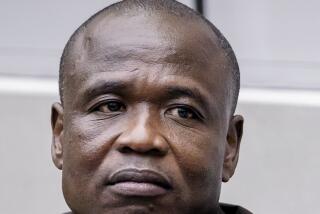Shutting down the Lord’s Resistance Army
Just before Christmas, the Lord’s Resistance Army, a rebel group with roots in Uganda, perpetrated a massacre in the Makombo area of the Democratic Republic of Congo. Over four days, the rebels hacked and clubbed to death more than 320 unarmed civilians and kidnapped 250 others, including dozens of children. Survivors and escapees interviewed by Human Rights Watch said that the rebels left a 40-mile trail of mutilated bodies, some still tied to trees.
The world learned only recently of the attack. It occurred in such a remote area that weeks passed before the horror was fully revealed. But although the scale and duration are surprising, the attack itself unfortunately is not. The Lord’s Resistance Army has been a scourge in the region for more than 20 years. Initially an insurgency against Ugandan President Yoweri Museveni, its political goals now are virtually nonexistent.
What is almost incredible is that this guerrilla band even exists. This is not the Revolutionary Armed Forces of Colombia, with thousands of foot soldiers, or one of the mighty drug cartels in Mexico, with legions of thugs. We’re talking about between several hundred and a few thousand bandits, many armed only with machetes.
A modicum of sustained political will could rout the rebels. Toward this end, we were pleased to learn that a few weeks before news of the Makombo massacre broke, the U.S. Senate unanimously passed the Lord’s Resistance Army Disarmament and Northern Uganda Recovery Act, championed by Sens. Russell D. Feingold (D-Wis.), James M. Inhofe (R-Okla.) and Sam Brownback (R-Kan.). The bill requires the Obama administration to develop a regional strategy to resolving the conflict.
The U.S. already provides strategic support and intelligence to the regional governments, and food and relocation resources to victims. But even with the best intentions, our approach has not been successful. In particular, a military effort to crush the rebels, carried out by the governments of Uganda and Congo and supported by the United States, backfired. As one Congo analyst put it, Operation Lightning Thunder, which ended in March 2009, was the equivalent of whacking a hornets’ nest; the rebels scattered and attacked hundreds of civilians in retaliation.
A comprehensive plan also should include a demobilization strategy for the fighters. That will pose a political challenge, as the rebels are dispersed among three nations, and an ethical one: Many of the brutal combatants are children who were abducted and never rescued.
Congo’s plight often seems overwhelming and intractable, but that is not the case here. We urge the House to speedily pass this legislation.
More to Read
Sign up for Essential California
The most important California stories and recommendations in your inbox every morning.
You may occasionally receive promotional content from the Los Angeles Times.










